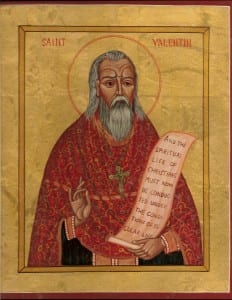 Ah, here come those chalky, colorful heart candies that whisper sweet nothings like “Tweet Me”. Things sure have changed since we traded cards in elementary school and talked face-to-face!
Ah, here come those chalky, colorful heart candies that whisper sweet nothings like “Tweet Me”. Things sure have changed since we traded cards in elementary school and talked face-to-face!
Valentine’s Day history
The history of Valentine’s Day is actually pretty intriguing. Many sources confirm that “Saint Valentine” was actually the name of several martyred saints under the Roman Empire. He is said to have ministered to persecuted, third-century Christians. He performed weddings for soldiers who were forbidden to marry. He also signed a letter “From your Valentine” to his jailer’s daughter. At the time, Claudius II had outlawed young men to marry, claiming that they made better soldiers than their wedded counterparts. When Claudius discovered Valentine’s rebellion, he had Valentine executed. Hence why Valentine wrote this letter from jail.
To contrast, the Romans allegedly celebrated Valentine’s Day as a feast day where they sacrificed a goat and a dog. Women lined up to be whipped with the animal hide by the drunk, naked men. These first “romantics” believed that this custom would make them fertile. Last, they drew names out of the proverbial hat to decide who would be a couple for the celebration. Well! Thankfully, Valentine’s Day morphed into a docile occasion for exchanging cards, sweets and flowers in the 18th-century. William Shakespeare and Geoffrey Chaucer likely would have influenced its popularity by that time.
What do we think of when we hear the word “love”? It could summon images of either romance or family. Better yet, how do we finish the sentence, “Oh, I just love…?” We may love decadent food, a profound book or a stunning outfit. However, do we truly love these things or do we mean to say that we just really like them? Perhaps the word “love” is overused. To say in the same breath that we love both something and someone implies at least two different levels of love. At least, one would hope so! To get at the heart of real love, we need not get all Roman-tic, but rather Greek.
What is love?
The English language uses only one word for love, while Ancient Greek uses four: agápe, éros, philía, and storgē.
Agápe. Unconditional, compassionate love. It is marked by sacrifice and selflessness. It is the highest form of love. People most often show it with charity during Christmas. In John 15:13, Jesus says, “There is no greater love than to lay down one’s life for one’s friends.” Jesus gave us the best example of agápe when he died for us on the cross in order to have relationship with us.
Eros. Physical, romantic and passionate love. It is characterized by a sensual desire and longing. Some have said that all logic and reasoning go out the window when éros is kindled. Enter romance, exit brain. This is also where the word “erotic” comes from. Quite appropriately, éros is associated with Valentine’s Day. Genesis 29:20 says, “So Jacob worked seven years to pay for Rachel. But his love for her was so strong that it seemed to him but a few days.” Jacob’s longing for Rachel was so intense that it changed how he perceived time altogether. He must have found Rachel very beautiful.
Philía. Love within a friendship. Unlike éros, philía is dispassionate and allows friends to be objective. It is platonic and tender. There is give and take to the relationship, so it is not totally selfless. 1 Samuel 20:17 reads, “And Jonathan made David reaffirm his vow of friendship again, for Jonathan loved David as he loved himself.” Jonathan fulfilled part of the greatest commandment by loving David the way that he loved himself. This is the kind of brotherly love shared between fellow Christians.
Storgē. Family love. It’s the natural affection that parents feel for their children. It is obviously associated with Mother’s Day and Father’s Day. Genesis 37:3 says, “Jacob loved Joseph more than any of his other children because Joseph had been born to him in his old age.” Joseph was precious to Jacob. Storgē is rarely found outside of the family.
Peter and Jesus also have an exchange about love in John 21:15-19. Translated from the original Greek, it is revealed that Peter feels philía for Jesus and that Jesus feels agápe for Peter. It is important to remember that Jesus loves Peter even though he can’t love Jesus unconditionally.
The world’s Valentine
After all the chocolate, flowers and gifts, we have to wonder if we have missed our first love. God is the world’s Valentine. His card to us would read the same as John 3:16. “For God loved the world so much that he gave his one and only Son, so that everyone who believes in him will not perish but have eternal life.” He offers us a valentine every moment: he allows our hearts to beat and our lungs to breathe. He’s forever reaching out to say, “Be mine.”
Sasha Richardson is a freelance writer and can be reached at [email protected].

Comments